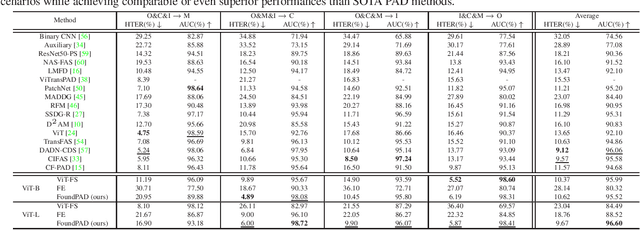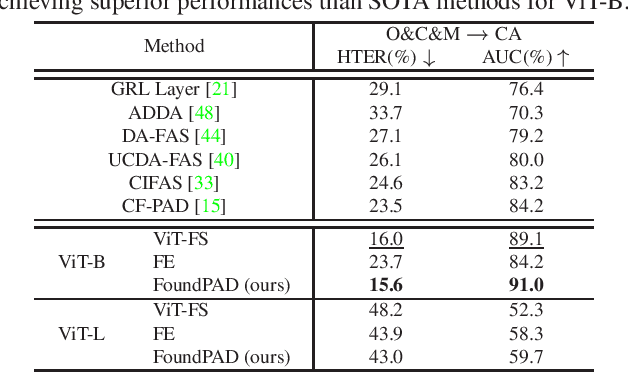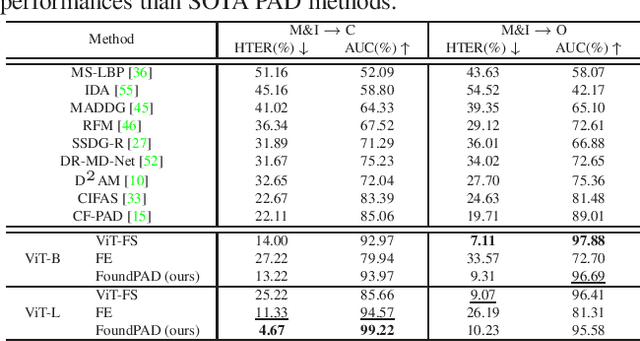Guray Ozgur
ViTNT-FIQA: Training-Free Face Image Quality Assessment with Vision Transformers
Jan 09, 2026Abstract:Face Image Quality Assessment (FIQA) is essential for reliable face recognition systems. Current approaches primarily exploit only final-layer representations, while training-free methods require multiple forward passes or backpropagation. We propose ViTNT-FIQA, a training-free approach that measures the stability of patch embedding evolution across intermediate Vision Transformer (ViT) blocks. We demonstrate that high-quality face images exhibit stable feature refinement trajectories across blocks, while degraded images show erratic transformations. Our method computes Euclidean distances between L2-normalized patch embeddings from consecutive transformer blocks and aggregates them into image-level quality scores. We empirically validate this correlation on a quality-labeled synthetic dataset with controlled degradation levels. Unlike existing training-free approaches, ViTNT-FIQA requires only a single forward pass without backpropagation or architectural modifications. Through extensive evaluation on eight benchmarks (LFW, AgeDB-30, CFP-FP, CALFW, Adience, CPLFW, XQLFW, IJB-C), we show that ViTNT-FIQA achieves competitive performance with state-of-the-art methods while maintaining computational efficiency and immediate applicability to any pre-trained ViT-based face recognition model.
MADation: Face Morphing Attack Detection with Foundation Models
Jan 08, 2025Abstract:Despite the considerable performance improvements of face recognition algorithms in recent years, the same scientific advances responsible for this progress can also be used to create efficient ways to attack them, posing a threat to their secure deployment. Morphing attack detection (MAD) systems aim to detect a specific type of threat, morphing attacks, at an early stage, preventing them from being considered for verification in critical processes. Foundation models (FM) learn from extensive amounts of unlabeled data, achieving remarkable zero-shot generalization to unseen domains. Although this generalization capacity might be weak when dealing with domain-specific downstream tasks such as MAD, FMs can easily adapt to these settings while retaining the built-in knowledge acquired during pre-training. In this work, we recognize the potential of FMs to perform well in the MAD task when properly adapted to its specificities. To this end, we adapt FM CLIP architectures with LoRA weights while simultaneously training a classification header. The proposed framework, MADation surpasses our alternative FM and transformer-based frameworks and constitutes the first adaption of FMs to the MAD task. MADation presents competitive results with current MAD solutions in the literature and even surpasses them in several evaluation scenarios. To encourage reproducibility and facilitate further research in MAD, we publicly release the implementation of MADation at https: //github.com/gurayozgur/MADation
FoundPAD: Foundation Models Reloaded for Face Presentation Attack Detection
Jan 06, 2025



Abstract:Although face recognition systems have seen a massive performance enhancement in recent years, they are still targeted by threats such as presentation attacks, leading to the need for generalizable presentation attack detection (PAD) algorithms. Current PAD solutions suffer from two main problems: low generalization to unknown cenarios and large training data requirements. Foundation models (FM) are pre-trained on extensive datasets, achieving remarkable results when generalizing to unseen domains and allowing for efficient task-specific adaption even when little training data are available. In this work, we recognize the potential of FMs to address common PAD problems and tackle the PAD task with an adapted FM for the first time. The FM under consideration is adapted with LoRA weights while simultaneously training a classification header. The resultant architecture, FoundPAD, is highly generalizable to unseen domains, achieving competitive results in several settings under different data availability scenarios and even when using synthetic training data. To encourage reproducibility and facilitate further research in PAD, we publicly release the implementation of FoundPAD at https://github.com/gurayozgur/FoundPAD .
 Add to Chrome
Add to Chrome Add to Firefox
Add to Firefox Add to Edge
Add to Edge